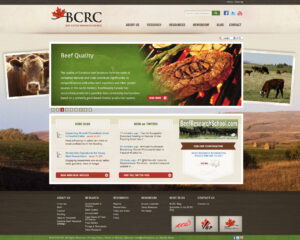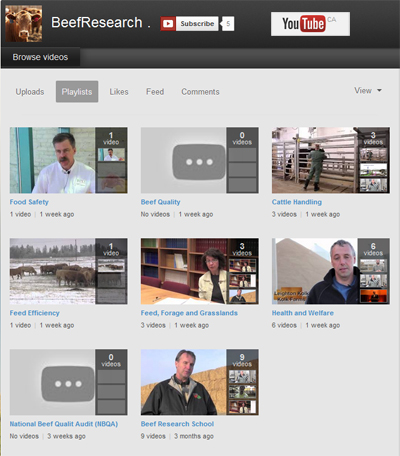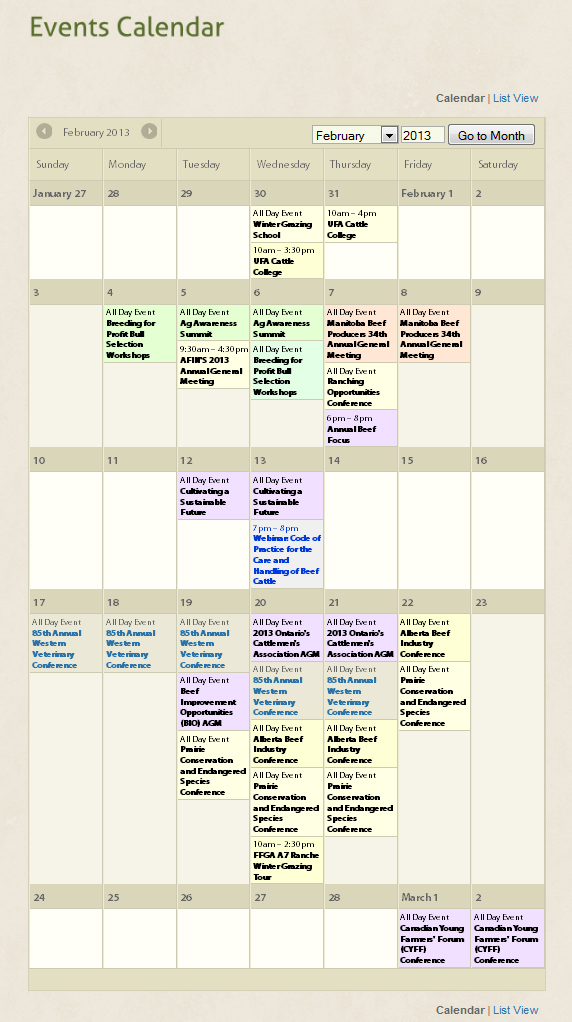Latest Information, Videos and Events Available on BeefResearch.ca
We strive to keep you up-to-date on the latest news and information related to Canadian beef cattle research and innovation. In addition to publishing articles through this blog on a regular basis, new information is continually added to other areas of our website. Here’s a highlight of some of the webpages, fact sheets, events, links and videos we’ve added lately.
New Background Information Pages
Lameness
Lameness is leg or foot pain that affects how cattle move. There are many different kinds of lameness, with many different causes, such as genetics, environment, injury, nutrition, and a variety of infections. Lameness can negatively affect both animal welfare and growth performance, because animals may be reluctant to eat or drink if standing or walking is painful. Read more…

On-farm Practices to Improve Food Safety
Cow-calf producers and feedlot managers have an important role to play in food safety. On-farm practices help to avoid certain food safety concerns at processing facilities to help ensure the safety and confidence of consumers. Practices at the farm level are particularly critical to avoid contamination of meat by chemical residues and broken needle fragments. Read more…
Castration
Castration is the removal or inactivation of the testicles. In earlier times, castration was used to help control cattle used to pull plows and wagons; oxen are tamer than bulls. Castration is now used as a management tool in modern agriculture for many reasons, including to:
- Cease the production of male hormones
- Prevent mating of genetically inferior livestock
- Decrease aggression to enhance on-farm safety for handlers and animals
- Decrease costs of managing bulls (larger, stronger facilities)
- Avoid price discounts from feedlots and meat packers
- Produce meat with a quality acceptable to consumers (higher grade, more marbling, more consistent) Read more…
Dehorning
Horns consist of a shell made of keratin and other proteins over a core of living bone. Removing horns allows cattle to be handled more safely and reduces injury to other cattle, which can also result in financial losses due to trimming of bruised carcasses. According to the latest National Beef Quality Audit, fewer than 11% of non-fed cattle and fewer than 13% of fed cattle processed in Canada in 2010-11 had any type of horns, and fewer than 3% had full horns, but the few horns that remain are costly. The economic loss to the industry caused by bruising is estimated at $2.10/head processed in addition to $0.06/head due to extra packing plant labor costs to remove horns from the carcass before skinning. Read more…
Nutritional Qualities of Beef
Beef is a nutrient rich food that can help people meet their nutrient needs within their calorie goals, as part of an overall healthy pattern of eating. This report summarizes beef’s role in health from the perspective of its nutrient content, Canadian consumption levels, an examination between red meat and chronic disease. Read more…
Economic Analysis
This page includes links to recently published Multiplier Analysis summaries, which updated the overarching multiplier established in 1992 to more accurately reflect the overall economic impact of the cattle and beef industry. The updated multiplier takes into account the industry’s total economic impacts, including direct and secondary impacts from backward and forward linkages of farm-level cattle production and related economic activities. Also considered are four multipliers in the areas of production/sales, GDP, employment and income. View summaries…
Market Power
Market power is the ability of a buyer or seller to influence the price of their purchases by exercising control over its demand, supply, or both. For example, the exercise of market power includes actions where a packer is able to raise its own profitability while reducing feedlots’ profitability. Read more…
New Research Results Fact Sheet
Antimicrobial Resistance in Campylobacter
Campylobacter jejuni can cause campylobacteriosis in humans, but generally doesn’t make cattle sick. Cattle are often thought to be a source of the C. jejuni bacterium found in sick humans, but no one ever knew for sure. The Beef Cattle Research Council supported a research project conducted by researchers at Agriculture and Agri-Food Canada and the University of Lethbridge to study this issue. These researchers used advanced DNA technologies to determine whether the same strains of C. jejuni are found in cattle and human patients in Southern Alberta. They also examined whether resistance to ciprofloxacin (an antimicrobial of very high importance in human medicine) has the same genetic basis in C. jejuni isolated from cattle and humans. In short, more than half of the types of C. jejuni isolated from humans were not found in cattle. Further, the mutations underlying ciprofloxacin resistance in C. jejuni isolates found in human patients were rare in the C. jejuni isolates found in cattle, and vice versa. Learn more…
New Videos
The Beef Research School
The Beef Research School video series is developed in partnership with RealAgriculture.com, and supported in part by the Alberta Livestock and Meat Agency Ltd. (ALMA) and the Agricultural Demonstration of Practices and Technologies (ADOPT) initiative under the Canada-Saskatchewan Growing Forward bi-lateral agreement. We let you know each time a new episode is ready through this blog, but if you’ve missed any along the way or want to watch them again, you’ll find them at BeefResearchSchool.com, or on our website.
More Doers than Talkers: Producers & Animal Care
A presentation by Ryder Lee, Canadian Cattlemen’s Association Manager of Federal Provincial Relations and staff support to the CCA Animal Care Committee.
Watch now…
Animal Welfare Issues and Initiatives in Canada’s Beef Industry
A presentation by Dr. Reynold Bergen, Beef Cattle Research Council Science Director.
Watch now…
Events Calendar
Visit our Events Calendar often to
- view upcoming field days, seminars and conferences in your area,
- be reminded of nomination, survey or application deadlines, and
- find out about online webinars of interest to you.
Events are colour-coded by province – BC: blue, AB: yellow, SK: green, MB: orange, ON: purple, and Maritimes: red.
To post an event to the BeefResearch.ca calendar of events, click here.
New Links
We’re continually adding to the Links page, and the ‘Learn more’ sections at the bottom of backgrounder pages, so there’s just too many to mention! Here’s just a few we’ve come across lately that we found particularly interesting or informative:
Video: How to Properly Apply a Tail Twist
Video: Efficient and Novel Method for Sorting Cow-Calf Pairs
An Economic Assessment of Feed Costs within the Cow-Calf Sector
Video: The Food Dialogues – Antibiotics and Your Food
The sharing or reprinting of BCRC Blog articles is welcome and encouraged. Please provide acknowledgement to the Beef Cattle Research Council and list the website address, www.BeefResearch.ca.
We welcome your questions, comments and suggestions. Contact us directly at [email protected] or generate public discussion by posting your thoughts below.
Stay connected by following us on Twitter @BeefResearch, liking us on Facebook, and subscribing to our YouTube Channel.

